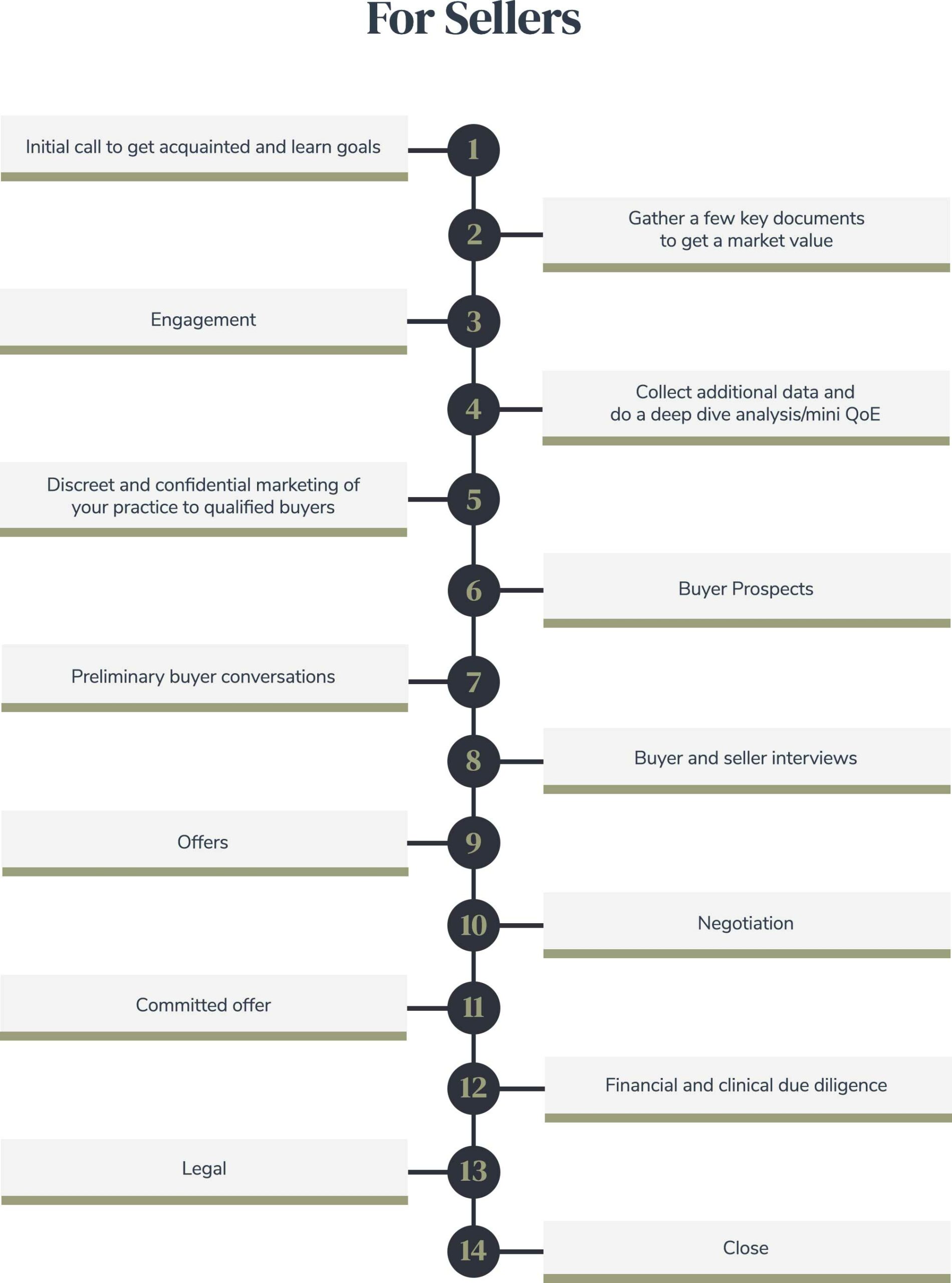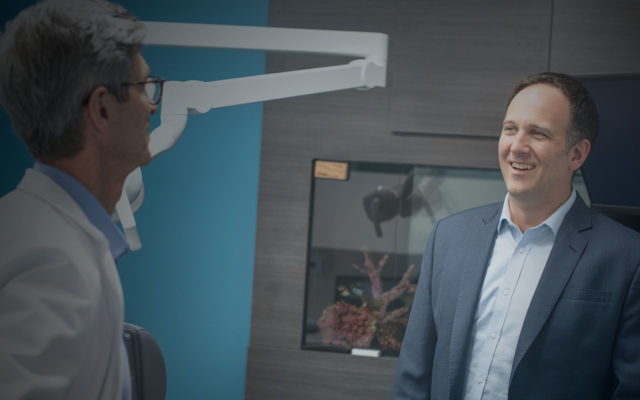Sell to DSO

SELLERSConsidering Selling Your Dental Practice?
Like most dental practices we talk with, you have built something special. You’ve probably built a successful practice from scratch or bought strategically.
But at some point, maybe you’ve become overwhelmed, fatigued, and burnt out. Maybe you feel uncertain about how your practice will provide for your family in the future.
Selling your practice is an excellent way to achieve the peace of mind, lifestyle, and financial freedom you deserve.
Many dentists don’t know that a skilled transition broker can negotiate a deal to bring you income years into the future (we call this monetizing your practice).
But selling your dental practice shouldn’t be a do-it-yourself process. You need to find a buyer that fits culturally, strategically, and financially. You’ll need the right financial valuation, value proposition, and marketing to sell your dental practice. You’ll also need someone at the table negotiating the best deal with the terms you want.
You’ll likely be the only person at your company that knows you’re ready for an exit, meaning you need someone offering anonymity, but has connections to the right buyers at the right time.
JW Practice Advisory specializes in getting deals done for dental practices. We work with buyers looking to buy a practice like yours, and sellers ready to take some risk off the table and get paid for their hard work.

SELLERSConsidering Selling Your Dental Practice?
Like most dental practices we talk with, you have built something special. You’ve probably built a successful practice from scratch or bought strategically.
But at some point, maybe you’ve become overwhelmed, fatigued, and burnt out. Maybe you feel uncertain about how your practice will provide for your family in the future.
Selling your practice is an excellent way to achieve the peace of mind, lifestyle, and financial freedom you deserve.
Many dentists don’t know that a skilled transition broker can negotiate a deal to bring you income years into the future (we call this monetizing your practice).
But selling your dental practice shouldn’t be a do-it-yourself process. You need to find a buyer that fits culturally, strategically, and financially. You’ll need the right financial valuation, value proposition, and marketing to sell your dental practice. You’ll also need someone at the table negotiating the best deal with the terms you want.
You’ll likely be the only person at your company that knows you’re ready for an exit, meaning you need someone offering anonymity, but has connections to the right buyers at the right time.
JW Practice Advisory specializes in getting deals done for dental practices. We work with buyers looking to buy a practice like yours, and sellers ready to take some risk off the table and get paid for their hard work.

SELLERSConsidering Selling Your Dental Practice?
Like most dental practices we talk with, you have built something special. You’ve probably built a successful practice from scratch or bought strategically.
But at some point, maybe you’ve become overwhelmed, fatigued, and burnt out. Maybe you feel uncertain about how your practice will provide for your family in the future.
Selling your practice is an excellent way to achieve the peace of mind, lifestyle, and financial freedom you deserve.
Many dentists don’t know that a skilled transition broker can negotiate a deal to bring you income years into the future (we call this monetizing your practice).
But selling your dental practice shouldn’t be a do-it-yourself process. You need to find a buyer that fits culturally, strategically, and financially. You’ll need the right financial valuation, value proposition, and marketing to sell your dental practice. You’ll also need someone at the table negotiating the best deal with the terms you want.
You’ll likely be the only person at your company that knows you’re ready for an exit, meaning you need someone offering anonymity, but has connections to the right buyers at the right time.
JW Practice Advisory specializes in getting deals done for dental practices. We work with buyers looking to buy a practice like yours, and sellers ready to take some risk off the table and get paid for their hard work.
FROM ORIGINATION THROUGH TO CLOSINGExpertise and Support Every Step of the Way
SELLER-BUYER FIT
Find an ideal buyer that fits your culture, strategy, and financial profile.
OPTIMIZED VALUATION MODEL
Build a valuation model that gets your dental practice the most value based on specific criteria.
TRANSITION MARKETING
Create marketing used in the deal process from initial reach-out to confidential information memorandums.
INITIAL NEGOTIATION
Structure and negotiate a deal leading to a non-binding signed Letter of Intent (LOI).
STREAMLINING DUE DILIGENCE
Aid your buyers through the due diligence process.
CLOSING NEGOTIATION
Negotiate all parts of the definitive agreement through a successful close.
When it comes to DSOs it is important to know they are not all the same
- DSOs can have very different management styles – larger DSOs tend to be more corporate and structured while small to mid-level DSOs tend to be a little more flexible
- They can also vary greatly in their patient philosophies – some DSOs prioritize high-volume, fast paced environments, while others focus on personalized patient care and longer term relationships
- A bigger DSO doesn’t mean they will provide a bigger offer – more often, the mid-level DSOs (who we also have relationships with) tend to pay more
Before partnering with a DSO, do your research or work with a broker who can help you (and who can increase your valuation to more than cover their fee). We work hard to find the best fit for our clients including values, culture and support systems. Your practice’s success and your patients’ well-being depend on making the right choice!
What you should know about brokers
- The ability to calculate your highest EBITDA takes experience and a level of detail and thoroughness that not all brokers have or provide and could lead to a significantly lower sale price
- Not all brokers have the quantity and quality of relationships with DSOs to get you the highest value and best fit possible for your practice
- Not all brokers go beyond the financials to take the time to understand your needs in an effort to find the best cultural fit for you and your practice
- There is a difference when it comes to local vs. national brokers – national brokers typically have more relationships and can bring more and higher offers to the table
- Some brokers are incompetent and don’t really know what they are doing, leading DSOs to avoid them – meaning DSOs won’t consider any doctors the broker brings to them
While there are many great brokers out there, some simply don’t have the expertise or relationships needed to get you the greatest value and cultural fit. A successful practice sale requires experience and strategy. We provide the DSOs with a level of detail and thoroughness that goes above and beyond to help build relationships and trust, putting us in a better negotiating position for our clients. There’s EBITDA and there is JW EBITDA
Let our experts work with you to develop a thoughtful plan and navigate your course to success.
TESTIMONIALSJoin 100’s of clients who recommend JW Practice Advisory to their friends
“As the owner of a dental practice looking to sell, we chose to engage John Wlodarek and team because of his experience, knowledge and expertise. They uncovered the best deal by matching my goals with the correct buyer, and even kept the deal together during the very difficult negotiating period. He provided guidance as a motivational coach during the emotionally draining final days before closing to carry to deal over the finish line. If you’re considering selling your dental practice, then you need John Wlodarek and JW Practice Advisory.”
Rex Gibson, DDS
Zooka Dental
“I’d highly recommend John Wlodarek and his team because they will get you the result you want from their proven process of due diligence and helping you choose the right situation for your practice. From day one, John took the time to understand my needs and the type of partner I was looking for. Without his help I’m not sure I would have found the right dental practice to partner with. If you are thinking practice transition, then you need the right person to help you and the best guidance from someone who cares about your dental practice.”
Shyam Desai, DMD
CT Braces
Proven Success
“There are a lot of smoke and mirrors in the brokerage industry today,” says JW Practice Advisory Principal John Wlodarek, “Transparency, this is important to me. I think it’s what starts to define us. Transparency implies openness, communication, accountability. So, for example, fees are clarified at the onset by a transparent agent, so there’s no surprises later. I would want to make sure that there’s accountability if I was selling my practice.”
The old methods of selling your dental practice have given way to new, innovative finance models. These models have shaken up the brokerage industry and created exciting opportunities for transitioning your practice, but they’ve also paved the way for more smoke and mirrors tactics when it comes to selling or buying.
We have a defined process where we advise dentists and work alongside them to find the best financial and culture fit to move on to the next stages of their career.


03Successful Transitions
We've worked with groups large and small, all over the country. See some of our past successes.
FAQFind Answers Here

Depending on who you talk to we are either approaching or in the middle of a recession. I’m not here to debate economics, but I can give you some clarity about the current state of the market and how what’s happening now impacts buyers and sellers alike.
With interest rates on the rise, people thinking about selling their practices are understandably wondering if buyers are even still buying. Meanwhile, buyers are wondering if valuations are holding because of the same interest rates. And to that, I answer yes and yes.
There are currently three types of buyers I’m seeing:
Group One: This is the group that has indeed stopped buying because of rising interest rates or because private equity is on hold, etc.
Group Two: This group is still buying but is more selective in the assets they’re purchasing and a bit more conservative when it comes to purchasing price and deal value.
Group Three: The opportunistic buyer. These buyers see things slowing down and either have the available private equity or excess dry powder to be opportunistic with little competition.
What exactly does this mean for sellers? In my opinion, it means now is the time to carefully consider the person or team you choose to represent you through the selling process.
For example, while group one may not be ready to buy they certainly won’t be advertising that and may very well still be exploring future options. So while a seller might think they have an interested party they could very well find themselves 6-12 months down the road, frustrated and waiting for a sale that is never going to happen.
Or take a recent client that had a potential buyer give them an estimate of $7.5M, take it or leave it. Thankfully they decided to leave it because, by the time we closed, they had a $15M offer.
The right broker will know how to create a truly competitive marketplace with multiple offers and no final ultimatums.
Are you willing to risk losing tens of thousands of dollars or even significantly more by trying to sell your practice yourself?
Or do you want to retire wealthy, healthy, and happy?
You’ve spent decades investing in and honing your skills and nurturing your business to sell and retire the way you want to.
Here’s why:
- Your practice may not be operating optimally (well managed with all its systems functioning well, no reduced fee dentistry, high gross and net incomes, state-of-the-art equipment, etc.)
- More sellers in the marketplace as Boomers plan on retiring around the same age
- There wasn’t enough time or money to bring in key dental technology tools to make your practice more attractive to buyers
- You invested your time in practicing dentistry and running a small business, not in understanding selling and buying practices on the marketplace
- You care about how your practice transitions to the new owner and how your legacy will be left and the impact on your patients and staff
- You were ready to retire yesterday and are struggling to establish a clear plan forward while still practicing and managing your business
See the below subsections, What is a Practice Transition Officer? What do they do? and How do I find the right one? to learn more.
Ultimately, you need a guide like myself and the team here at JW Practice Advisory.
In general, a skilled practice transition officer is worth their weight in gold. Though yes, they charge fees, they specialize in assessing practice values, the dynamics of the current market, and selling and negotiating businesses. In the end, they will not only get more money for your practice, they’ll help you survive the selling and buying process. Remember when you bought and sold your house? Multiply this emotional guidance by 1,000.
A practice transition officer’s main role is to guide you through the selling and buying process for your dental practice. In addition, they often help ensure a successful transition of your practice to the new owner keeping your patients and staff in mind.
They offer many benefits including extensive knowledge of the dental practice marketplace, ways to improve your business operations to increase the “attractiveness” of your business to buyers, expert sales and buying negotiation skills to get your practice’s full worth, and establishing a transition plan to protect your legacy when the practice switches owners.
Before you look for the right fit with a transition officer, it’s best to do these three things:
- Get your financials together. Understanding your financials and being prepared to share a financial sketch will help you while interviewing officers to hire.
- Make a list of your retirement goals, concerns, and expectations. This will ensure that you communicate this clearly and accurately to the officer.
- Ask your dental friends, associations, and groups for officer referrals.
When you’re ready to reach out to your referrals, once you’ve completed the three steps above, use the following list while interviewing officer candidates and your decision will be easy to make:
Q: Are they full time? Do they only work on dental practice transitions?
Ideally, yes. This demonstrates their skill level, they’re able to succeed full time, and that they have a strong relationship with buyers, essential when selling your practice.
Q: Will they keep your information confidential while marketing your practice and vetting buyer interest?
Ideally, yes. This saves you time as you’ll only be included once serious and able buyers are identified.
Q: How long does the average sales process take?
On average, the process takes around 6-9 months.
Q: Are they using a known and accepted methodology to determine the valuation of a practice?
Absolutely, yes. You want to make sure that the valuation methodology of your practice is accurate and will be accepted by the buyer.
Q: Do they assess the operations of your practice and suggest short-term, attainable ways to increase its value before taking it to market?
Absolutely, yes. While some practices have already invested in running their operations optimally, others have not. For those that have not, there are multiple short term changes that will increase the practice value in the marketplace.
Q: What is their fee? Are there additional fees that you’d be responsible for?
Ask for clarity on what and how you’ll be charged. It’s a good sign if they take the time to explain their cost structure. And yes, there are other fees, such as a lawyer or an accountant, that you will need to cover in addition to their fee. Again, clear communication is key here.
Q: How do they market to and vet practice buyers?
This is where transition officers should take cues from you, the seller, as to what your preferences are. If you don’t have any, ask the officers what works best for other dental practice owners to get the conversation going.
Q: How are transitions typically structured? Is there anything you need to know up front?
As a successful transition will set up your legacy, and the next owner, to continue in success, it’s important to be aware of how this works and your role so that you know what to expect.
Q: How common is seller financing in your area?
Financing is common though it does differ by state. See if they have thoughts or resources to share regarding your state.
Q: Are they single or dual representation (e.g. do they serve both sellers and buyers)?
Dual agency is what allows a broker to represent both the selling and buying parties.
However, in our experience, what we’ve seen is doctors not receiving the best deal due to biases within their dual agency broker.
At JW Practice Advisory, there are no biases. Our top priority is ensuring you’re getting the best valuation for your practice, and are able to enter your ideal situation — whether you are buying or selling.
Q: Are they affiliated or have professional arrangements with any Dental Service Organization (DSO)?
Some brokers get kickbacks from some DSO’s which can cause a conflict of interest. Instead of finding a buyer that is truly the right cultural and financial fit, the broker may only steer their client to certain DSO’s so they can receive that kickback. At JW, we pride ourselves as being ethical brokers by doing what is right for the client.
Generally, dental practice appraisals are only necessary during business partnership dissolutions and divorces. Any asset that goes to court over its value must have an appraisal.
However, when selling a practice, the valuation is more important. This includes, not only assessing the value of the practice but the current supply and demand in the dental practice marketplace among other factors.
Just because a practice was appraised at a certain price, doesn’t mean the market won’t pay more than that. This is where the value of practice transition experts truly come in since their knowledge and experience with practices and the dental industry helps them drive that value.
Secondly, don’t pay $30,000 to get a valuation. It’s completely unnecessary (unless the circumstances described above apply). Neither the bank nor the buyer will ask for that. What they’ll ask for instead are one tax return, one profit and loss statement, and some data reports from your accounting software.
After looking at these numbers, they’ll have a good idea of the value of your practice. Of course, some unknowns could pop up and a good broker will help bring those to light and see if there are ways to mitigate any issues pre-sale.
Maximizing ROI on your existing equipment
Though this can tie into offsetting your PPE costs by repurposing some of your existing equipment inventory, there are a few major differences that deserve some additional consideration. I often hear clients talk about the expensive equipment they purchased for services that their clients don’t know they offer. Other times, the dentists themselves don’t know the full limits to which they can use their technology investments. Depending on your equipment, you might be able to increase your ROI by using it to its fullest potential.
Technology is a part of dentistry today and will only grow more complex in the future. It’s important to make sure you’re maximizing your tech by finding ways to expand its service capacities (via advanced training or creative, innovative applications) and then to stop referring out for services that your training and practice innovations enable you to now do in-house. This is definitely worth the investment as it will pay off by increasing your equipment ROI.
By renegotiating your lease
Every landlord knows that dentists need space to operate their practice. Sure, this seems obvious, but it means that dentists’ have bargaining power. You might be paying higher than market price for rent or paying for fees and space updates that your landlord should be covering. Let’s put an end to that.
Even if your lease isn’t up for renewal in the next 5 years, it’s best to start renegotiating your lease now so that you make sure you save money the next time you renew your lease.
Merchant credit card processing service creativity
It’s highly unusual to find a practice that doesn’t accept credit cards. However, every time a credit card transaction is completed, the dentist is hit with a fee to offer convenient payment options to their patients.
What many practices don’t know is that there are creative ways to lower these fees, saving you money that you could be investing in your practice to get a higher value instead.
Creative lending refinance opportunities
Here’s another instance where dentists could get stuck with long term recurring fees. I should know, I worked for one of the largest banks for many years. However, what every practice needs to know is that there are creative ways to lower these financing fees While there are a few key players in the dental financing space, they all offer different interests rates, pre-payment penalties and other terms. Your decision will ultimately be determined by what’s best for your practice.
Here’s the question that all my clients want to know. The short, but by no means simple answer is this: by increasing the value of your practice over time by investing in practice transition consultants, more in-house procedures training, and digital marketing.
Here’s why investing money in these three areas now will wind up making you more money in the end.
Hire consultants that specialize in selling and buying practices to review your practice 10-15 years before when you’d like to sell and retire frequently
If you invest the time and money in running your practice as efficiently as possible, you’ll save and make more money along the way and bring in a higher value when you’re looking to sell.
Invest in training on, and bringing in-house, dental procedures with high ROI
The more procedures you can offer in-house, the more money you’ll keep in your practice. However, be judicious in deciding which procedures are a worthwhile investment to offer in-house and which should forever remain ones to refer out. This is where it is necessary to hire skilled dental consultants who offer specialized training and consulting on new procedures.
Increase your digital marketing prowess
More and more patients are relying on the internet when looking for a dentist. That’s great news since digital marketing can be more cost-effective and success rates are easier to measure.
You also have more flexibility in keeping your copy and images fresh and changing them up if you’re not seeing much response for your efforts. Though remember that generating and consistently sharing quality content is the most important of any online marketing strategy. If you’re new to digital marketing, not getting the results you want, or unable to consistently create compelling content, then it’s time to consider outsourcing your marketing to an expert.
As you can see, if you’re planning on retiring in the next couple of years, you have some life-changing decisions to make as soon as possible.
Here’s my promise to you: not only will I save you money, I’ll make you money and help you retire the right way.
PRIVATE CLIENTSWe've streamlined the transition process
Leverage agile frameworks to provide a robust synopsis for high level overviews. Iterative approaches to corporate strategy foster collaborative thinking to further the overall.
Value proposition organically grow the holistic world view of disruptive innovation via workplace diversity and empowerment. Bring to the table win-win survival.

Ready to find out what your practice is worth?


 This is some text about the listing. Here’s the story behind it that numbers don’t tell. One more sentence of description so that it is a reasonable length.
This is some text about the listing. Here’s the story behind it that numbers don’t tell. One more sentence of description so that it is a reasonable length. This is some text about the listing. Here’s the story behind it that numbers don’t tell. One more sentence of description so that it is a reasonable length.
This is some text about the listing. Here’s the story behind it that numbers don’t tell. One more sentence of description so that it is a reasonable length.